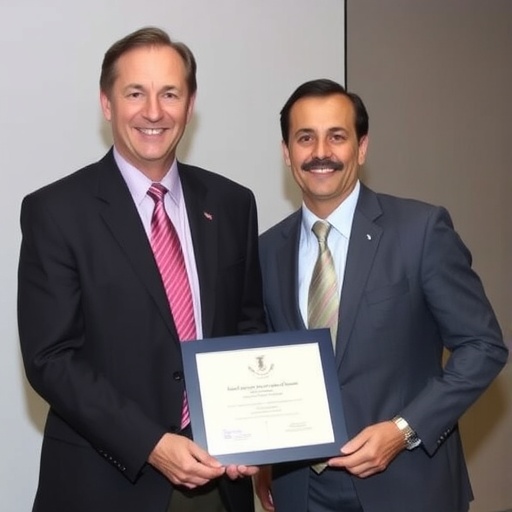Peter Tontonoz, M.D., Ph.D., a distinguished professor at the University of California, Los Angeles (UCLA) and holder of the Frances and Albert Piansky Endowed Chair, is set to receive the prestigious Basic Research Prize from the American Heart Association (AHA) at the upcoming Scientific Sessions 2025 in New Orleans. This recognition, scheduled for November 9th during the Presidential Session, highlights Dr. Tontonoz’s pioneering research on lipid metabolism and its critical implications for cardiovascular and metabolic diseases. His work represents a transformative step forward in understanding how cholesterol and other lipids influence heart health, offering new avenues for therapeutic innovation.
Dr. Tontonoz’s scientific journey has been marked by significant milestones that have deepened the biomedical community’s grasp of fat metabolism at multiple biological scales, from single cells to entire organ systems. His research has unraveled complex molecular processes that regulate cholesterol and fatty acid dynamics, enlightening the pathophysiology underlying heart disease, diabetes, and related metabolic disorders. His laboratory’s discoveries have provided foundational knowledge crucial for developing novel treatments aimed at improving patient outcomes in cardiovascular medicine.
One of Dr. Tontonoz’s landmark achievements is the identification of a specific E3 ubiquitin ligase targeting the low-density lipoprotein receptor (LDLR) for degradation. This finding has profound clinical implications, as it revealed a regulatory checkpoint beyond traditional statin therapy, which primarily inhibits cholesterol synthesis. By elucidating the mechanisms controlling LDLR levels, his work opened the door to innovative cholesterol-lowering strategies that could complement or surpass the efficacy of existing drugs, potentially reducing cardiovascular risk in broader patient populations.
In addition to his contributions in the regulation of LDL cholesterol, Dr. Tontonoz was instrumental in characterizing the Liver X Receptor (LXR), a nuclear receptor that bridges lipid metabolism with immune function. His studies with LXR have been pivotal in establishing the emerging discipline of immunometabolism, where metabolic pathways are intricately connected to immune responses. This cross-disciplinary insight has expanded researchers’ ability to target inflammatory processes within cardiovascular disease, shedding light on how metabolic states influence immune cell behavior and disease progression.
Furthering the scope of lipid-related physiology, Dr. Tontonoz’s research identified enzymes responsible for membrane phospholipid remodeling, which are crucial for maintaining intestinal and hepatic function. These enzymatic pathways have implications not only for lipid absorption and metabolism but also for cellular signaling and membrane integrity, elements vital to metabolic homeostasis. Understanding these intricacies offers potential leverage points for therapeutic intervention in metabolic syndrome and associated conditions.
In a more recent breakthrough, Dr. Tontonoz’s team characterized Aster, a novel cholesterol transfer protein that facilitates the movement of cholesterol from the plasma membrane to the endoplasmic reticulum. This discovery highlights a previously underappreciated mechanism in lipid homeostasis, emphasizing the dynamic nature of cholesterol trafficking within cells. The identification of Aster underscores the complexity of dietary lipid uptake, offering fresh perspectives on how intracellular lipid distribution influences health and disease.
The broader impact of Dr. Tontonoz’s work is echoed in the field’s movement toward precision medicine. By dissecting the molecular underpinnings of lipid metabolism, his findings provide a scaffold for developing treatments tailored to individual metabolic profiles. This strategic direction holds promise in addressing the global burden of cardiovascular and metabolic diseases, which continue to be leading causes of morbidity and mortality worldwide.
As a prolific scientist, Dr. Tontonoz has a storied history of mentorship and academic leadership. His role extends beyond research as he supports the growth of early-career scientists and contributes to national scientific discourse through study sections at the National Institutes of Health and editorial positions on prominent journals, including Journal of Clinical Investigation and Proceedings of the National Academy of Sciences. His leadership fortifies the scientific community’s capacity to tackle pressing biomedical challenges.
Dr. Tontonoz’s scholarly output includes seminal publications during his graduate studies at Harvard Medical School, where he identified key regulators of adipose tissue development—most notably PPAR-gamma—and lipid biosynthesis, such as SREBP1c. These foundational discoveries have been cited extensively, influencing decades of lipid biology research. His robust citation record, exceeding 220 peer-reviewed articles, reflects the lasting importance of his contributions to biochemistry and cardiovascular medicine.
The upcoming award by the AHA not only honors Dr. Tontonoz’s past achievements but also anticipates his ongoing influence on cardiovascular science. The American Heart Association recognizes the transformative nature of his work in elucidating mechanisms that govern lipid function and their role in disease, underscoring the critical nexus between basic research and clinical innovation.
In acknowledging this honor, Dr. Tontonoz emphasized the profound complexity of lipid biology and the need for continued research. His dedication to illuminating how fat metabolism intersects with both normal physiology and pathology embodies the spirit of scientific inquiry essential to overcoming cardiovascular diseases. His work resonates broadly, promising to expedite discoveries that could ultimately enhance the quality of life for millions worldwide.
As cardiovascular disease remains the leading cause of death globally, groundbreaking research such as Dr. Tontonoz’s is vital to advancing medical science. His insights into lipid metabolism provide new targets for drug development and enhance the scientific community’s understanding of cardiometabolic health. These strides exemplify how deep mechanistic research translates into tangible benefits for patient care and public health.
The Basic Research Prize at the American Heart Association Scientific Sessions 2025 will highlight Dr. Tontonoz’s seminal contributions, celebrating a career devoted to unraveling the complexities of lipid biology. In doing so, it not only honors his individual accomplishments but also inspires the next generation of researchers dedicated to cardiovascular and metabolic disease research.
Subject of Research: Lipid metabolism and its role in cardiovascular and metabolic diseases, including studies on cholesterol regulation, immune-metabolism interactions, and novel proteins involved in lipid trafficking.
Article Title: UCLA’s Peter Tontonoz Awarded the 2025 American Heart Association Basic Research Prize for Transformative Discoveries in Lipid Metabolism
News Publication Date: September 15, 2025
Web References:
- https://newsroom.heart.org/news/ucla-distinguished-professor-cvd-researcher-to-receive-2025-basic-research-prize?preview=99da308ca5dd268d5a980b01c05fc923
- https://x.com/HeartNews
References: Based on peer-reviewed scientific research and awards announcement by the American Heart Association.
Image Credits: Not provided.
Keywords
Cholesterol, Lipids, Fatty acids, Biochemical analysis, Applied sciences and engineering




